With Texas and Oklahoma moving to the SEC and forming a superconference, a group of Los Angeles Times writers gathered for a key experiment.
Commissioners Thuc Nhi Nguyen, Bill Plaschke, J. Brady McCollough and Ryan Kartje agreed to draft four, 16-team superconferences.
What would the highest level of college football’s conference maps look like if there were no rules, other than a draft? Join us during the next hour to find out.
- Share via
Meet the Gold Standard, Coast-to-Coast, No Buyout League and Prestige 16
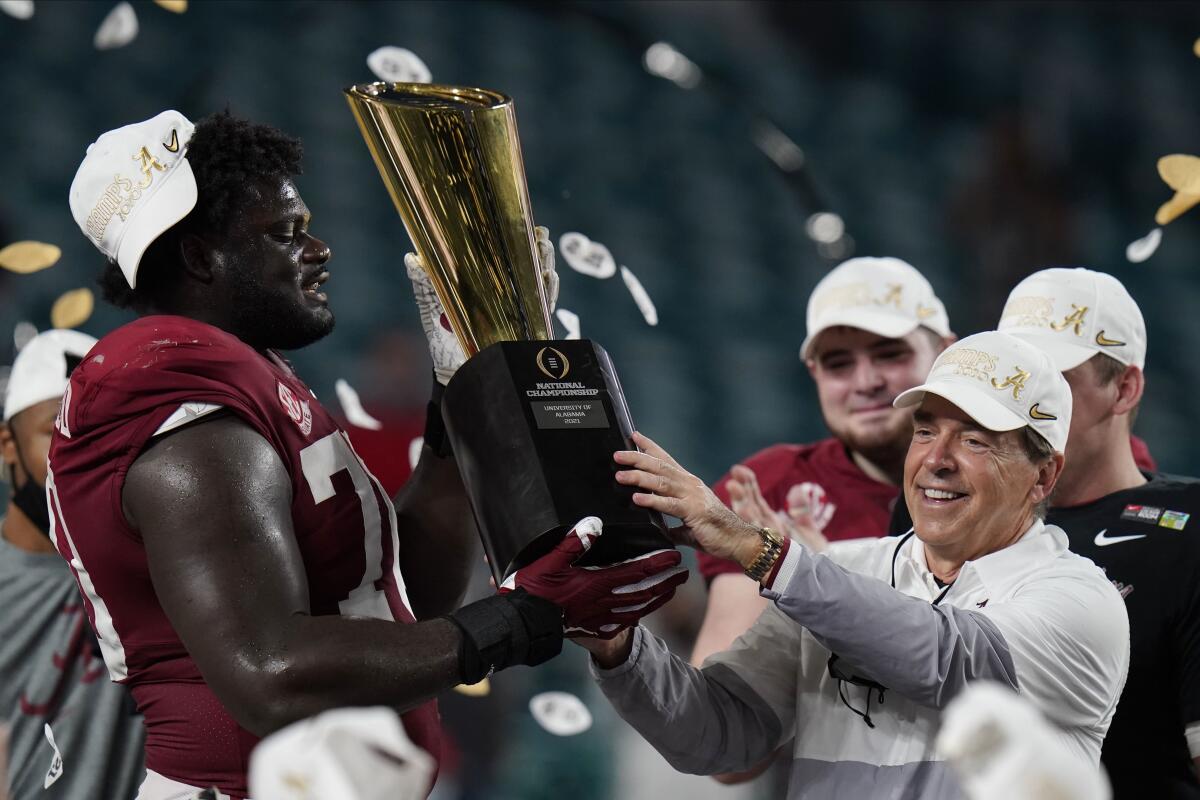
And now our commissioners explain their picks.
With few rules, this is how they built four 16-team superconferences:
The Gold Standard Conference
The teams: Alabama, Florida, LSU, Auburn, UCLA, Nebraska, Michigan State, Cal, Utah, Minnesota, Boise State, Maryland, Pitt, Missouri, NC State and Rutgers.
The rationale: “It’s an Olympic year so it’s time we put some respect on the Olympic sports, specifically the jewel of the Games: women’s gymnastics. So while football is a foundational piece of the Gold Standard Conference, gymnastics is a big part, too. I couldn’t build a gymnastics super group without the gymternet’s favorite team UCLA, so there was no way I was giving the Bruins to Bill Plaschke in exchange for Stanford. Sorry Bill, I’m sure we can keep the cross-town rivalry alive.
“The opportunity to add Oregon and Washington was enticing, but Oregon would have been the ugly no-gymnastics duckling. Was it crazy to weigh gymnastics so heavily when football is still king? Probably. But it’s my conference and just another reason why I’ll be sticking to my day job instead of applying to any open commissioner positions anytime soon.”
— Thuc Nhi Nguyen
Coast-to-Coast Conference
The teams: USC, Texas, Penn State, Miami, Wisconsin, Stanford, Baylor, BYU, West Virginia, UCF, Iowa State, Navy, Army, San Diego State, Arizona and Air Force.
The rationale: America deserves a college football conference that speaks to all of America; geographically diverse, culturally inclusive and crazy competitive.
America deserves a conference where intersectional rivalries occur every week, annual showdowns occur everywhere and the ultimate winner is a champion for everyone.
America deserves the CCC, the Coast-to-Coast Conference deftly drafted to embrace and energize this country’s college football fans from goalpost to shining goalpost.
The CCC Western Division is anchored by USC and Texas, two programs with huge TV followings and unlimited NIL potential. The Eastern Division cornerstones are stalwart Penn State, solid Wisconsin and flashy Miami — all three schools with enormous potential broadcast revenues and huge widespread followings.
The West is filled out with a mixture of national brands, local favorites and just plain tradition: Stanford, Baylor, BYU, San Diego State, Arizona and Air Force.
The East is filled out with raucous West Virginia, high-ceiling UCF, upstart Iowa State and beloved Navy and Army.
You’ve seen the teams, now imagine the possibilities. The first weeks will feature great long-distance clashes like USC-Penn State, Texas-Miami, Stanford-Wisconsin and Air Force-Army.
Then, as the season progresses, the schedule will turn to traditional rivalries, and the conference has ensured that each school will have one. Miami will play UCF, Texas will battle Baylor, USC will dual Stanford, Penn State will meet West Virginia, and Wisconsin will stare down Iowa State.
And, of course, the schedule ends with an Army-Navy game that will contain its annual fanfare with the added bonus that it could now decide a division championship.
The CCC is built to overcome the problems facing other conferences. It’s not just one region, it’s not just one type of university, it’s not just one powerhouse team. It’s different legacies, different missions, different kids, all with the same goal of claiming a title trophy that will be a silver version of a United States map.
The CCC looks like America, feels like America and will produce the sort of competitive college football that will make America proud.
— Bill Plaschke
NBL: No Buyout League
Heartland Division: Ohio State, Northwestern Illinois, Ole Miss, Texas A&M, Oklahoma, Oklahoma State, Arizona State
Blue Ridge Division: Georgia, Florida State, North Carolina, Duke, Kentucky Louisville, Virginia, Virginia Tech
The rationale: The No Buyout League brand says it all: Once you’re in the richest and most well-rounded conference in our reimagined landscape of college athletics, you’ll never want to leave. We invited schools with fan bases whose worlds stop for Saturdays.
Have you ever been to Columbus? For a city of that size, there’s absolutely nothing to do other than dream of walking along the beautiful brown Olentangy River on the way into the “Horseshoe” under a gunmetal gray sky, pridefully spelling a four-letter word with 100,000 of your best friends who’ve also been carrying around cases of Natural Light all morning.
Our powerhouses in Norman and Athens improve our culture from Columbus and bring the same all-in devotion to excellence. Certainly, with two schools who have committed tens of millions of dollars to Jimbo Fisher as the face of their universities in Texas A&M and Florida State, we continue to make up for Ohio State as our flagship.
The NBL will compete for national championships in football annually and boast the unquestioned most dominant men’s basketball conference in college sports history, featuring: North Carolina, Duke, Kentucky, Louisville and Virginia. Oh, and you want media markets? How about Chicago, Dallas, Houston, Atlanta, Phoenix, Washington, D.C., and, of course, the Buckeyes bring the whole country with the reach of “O-H-I-O!”
— J. Brady McCollough
Prestige 16
The teams: Notre Dame, Michigan, Clemson, Oregon, Washington, Tennessee, Iowa, South Carolina, Arkansas, Georgia Tech, Cincinnati, Houston, Indiana, Kansas, TCU and Texas Tech.
The rationale: Steeped in tradition, our schools have dominated college football from its inception. We’re the conference of John Heisman. Of Fielding Yost. Of Knute Rockne. It was only fitting then that our draft board began in the Midwest, the cradle of college football, where there are no two schools more iconic than Notre Dame and Michigan.
Realignment isn’t just about the past, though. It’s about the future. It’s about Clemson, with its four CFP trips in five years, Oregon, with its Nike money, and Washington with its strong base in Seattle. After all, like any proper superconference, we are purely about the dolla, dolla bills, y’all.
As we settled into college football’s middle class, balancing geography, TV markets, tradition and everything else was not easy. The Prestige 16 is still upset over losing Wisconsin, which would’ve really rounded out the Midwest contingent. Clemson should have a pretty easy ride in our South division for a few years, while Tennessee, South Carolina, Arkansas, and Georgia Tech all find ways to recapture their past glories. But with Alabama, Georgia, LSU, and Florida elsewhere, they will, and they’ll be followed soon after by some big-market, up-and-comers who have been held back by their Group of Five, like Houston and Cincinnati.
Until then, we will rest on our laurels and our NIL money.
— Ryan Kartje
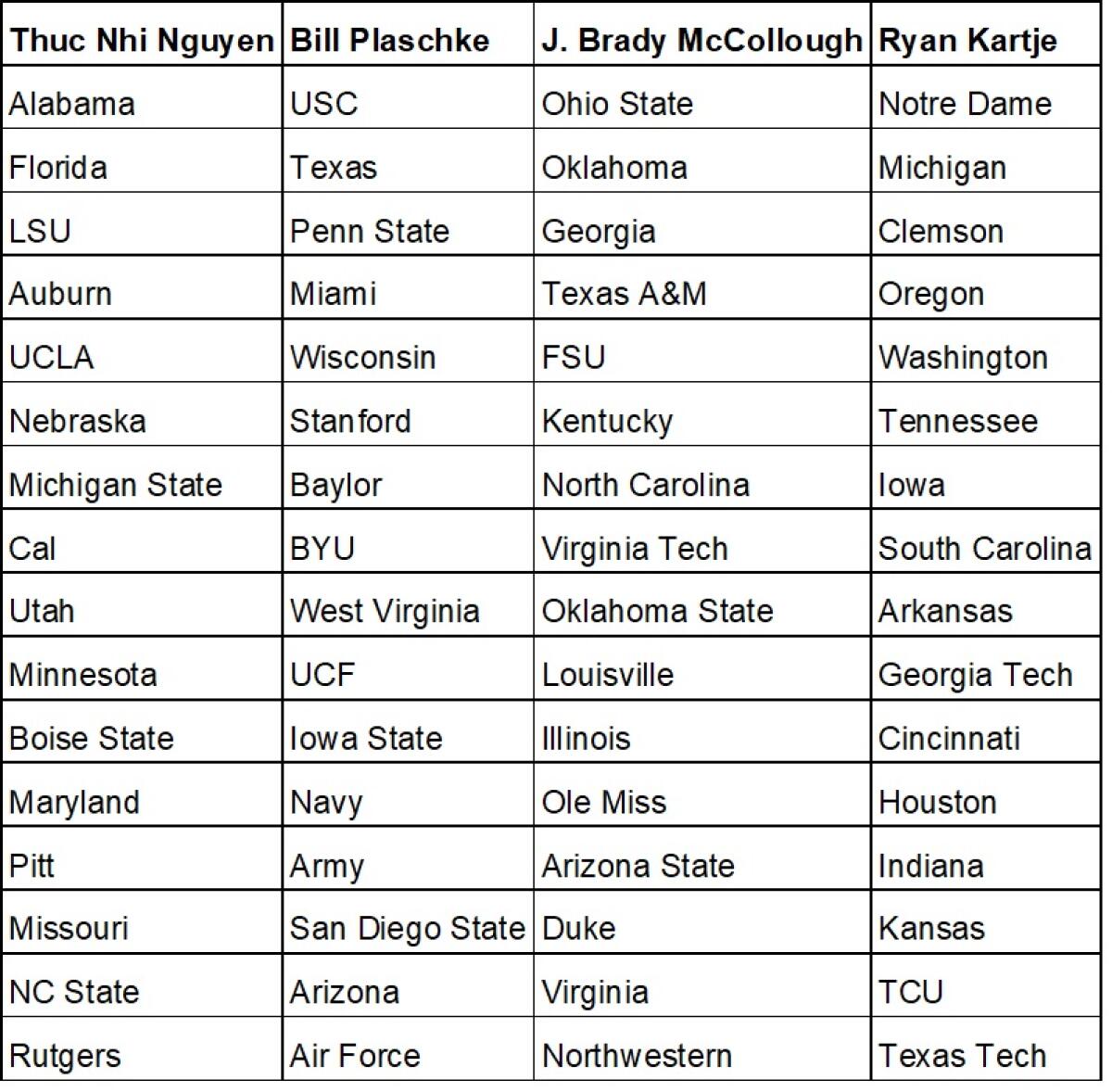
- Share via
We complete our 64 selections without a few current SEC schools
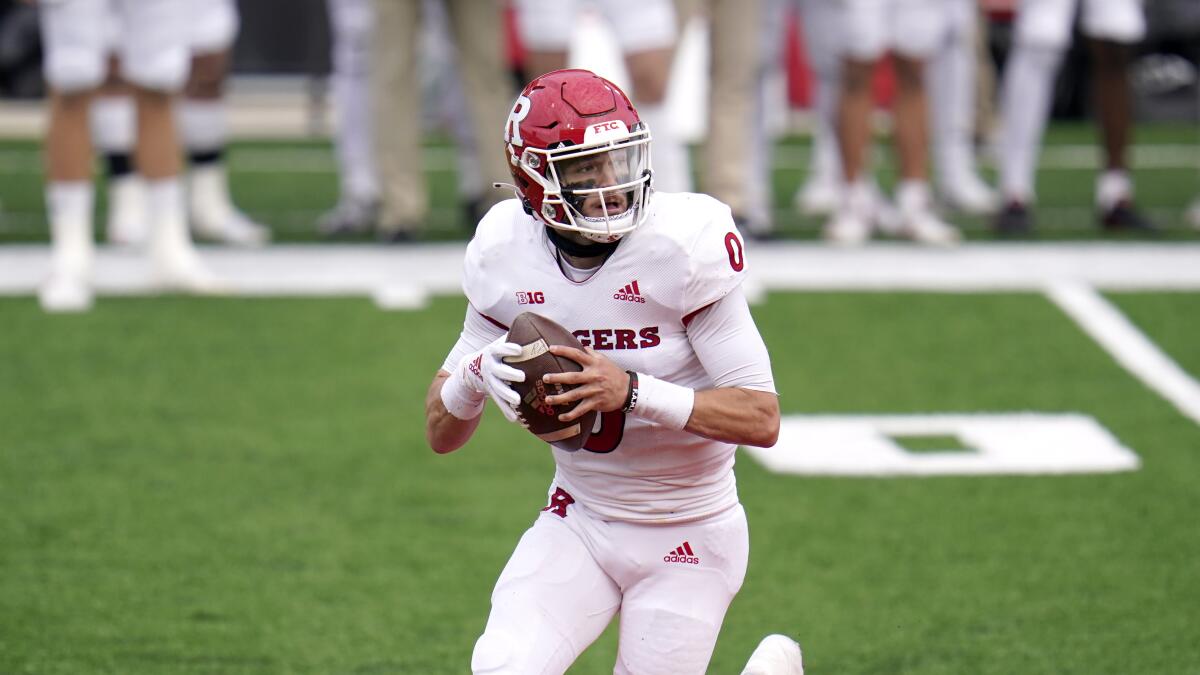
As our college football superconference draft neared its conclusions, unsuccessful trade offers picked up steam.
A recap of the rejected trade offers:
Bill Plaschke to Thuc Nhi Nguyen: Stanford for UCLA (twice rejected)
Ryan Kartje to Nguyen: Oregon and Washington for some SEC schools to be determined
Kartje to Plaschke: Oregon and Washington for Wisconsin and Penn State
Nguyen to Plaschke: Minnesota for BYU
Plaschke to J. Brady McCollough: West Virginia for Arizona State (twice rejected)
McCollough to Plaschke: Arizona State for West Virginia (Plaschke said it was too late)
The final 64 picks are listed below.
Mississippi State and Vanderbilt are among the current Power Five teams that didn’t make the cut.

Coming soon, our commissioners explain their picks and name their superconferences.
- Share via
Group of Five teams really start crashing the party
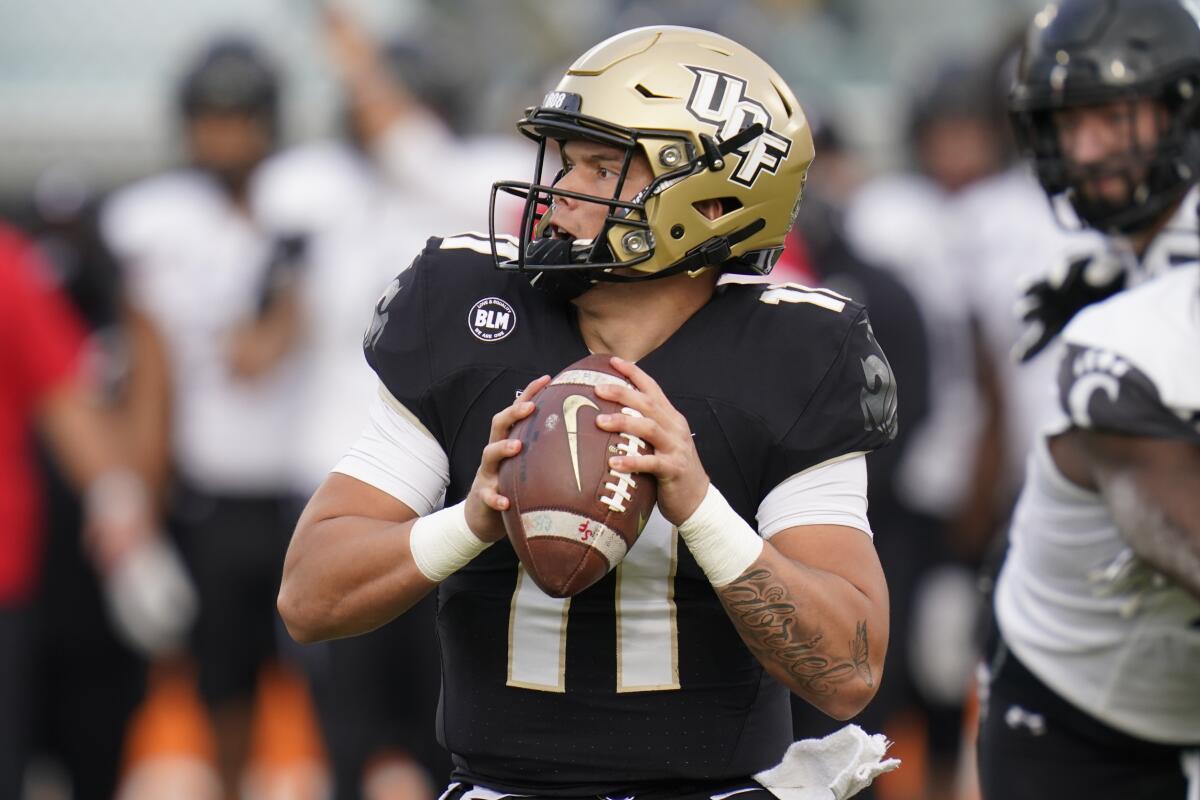
It turns out our Los Angeles Times writers don’t think the bottom of the Power Five is better than the top of Group of Five.
When pressed, drafting solely for pride, they selected a wave of Group of Five schools to crash the party during picks 33 through 48.
UCF, Boise State, Cincinnati, Houston and Navy all get promotions ahead of Pitt, Arizona State, Missouri, Arizona, Virginia, Northwestern and others.
In between the wave of American Athletic Conference poaching, J. Brady McCollough selected a noteworthy SEC team at No. 46, stating:
“You can’t have a real superconference without tailgates in the Grove. And Lane Kiffin.
“Ole Miss.”
Bill Plaschke went back to the Group of Five pool at No. 47.
“My conference is about creating national attractions somewhere every weekend … I’ll take Navy.”
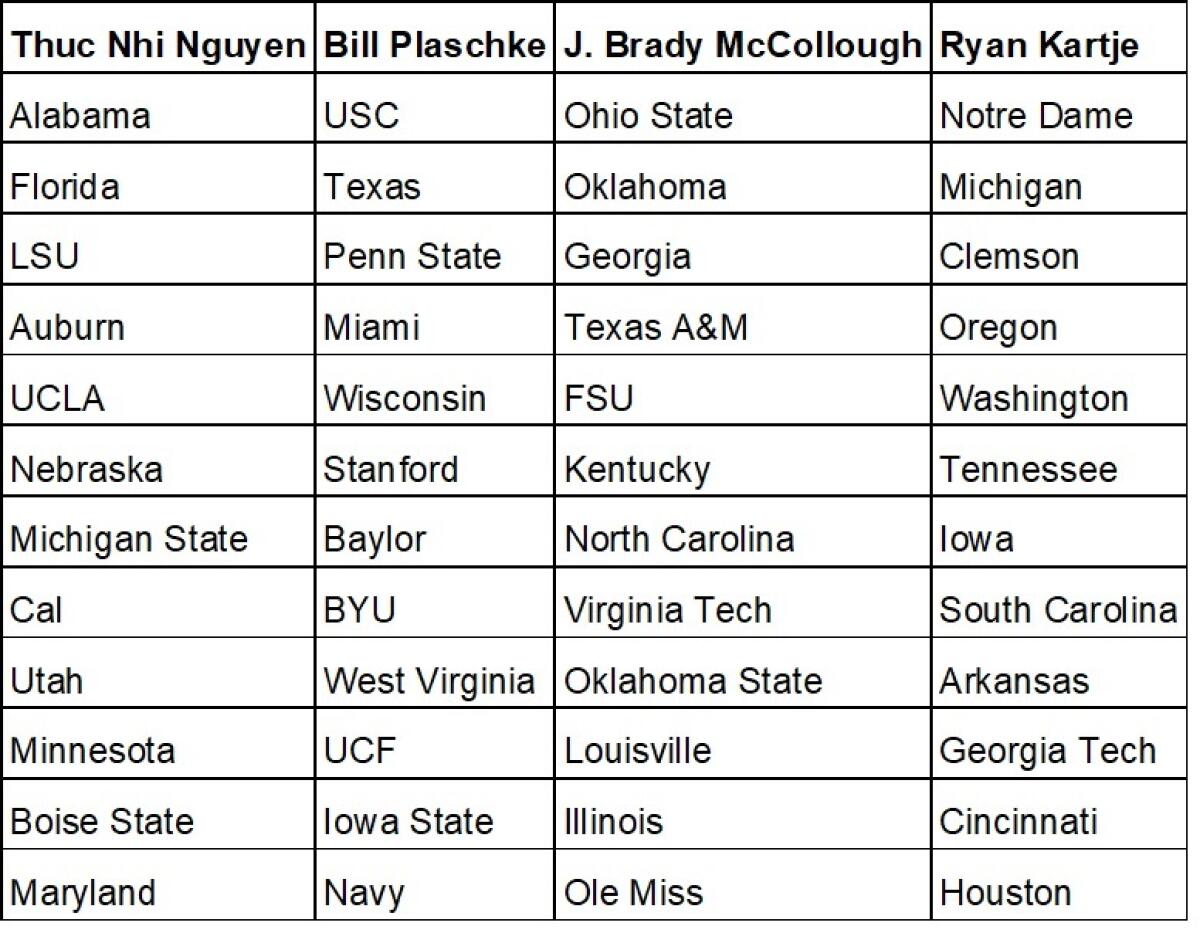
Check back soon for our final picks, trade efforts and defense of the picks.
- Share via
Our first non-Power Five team enters the pool
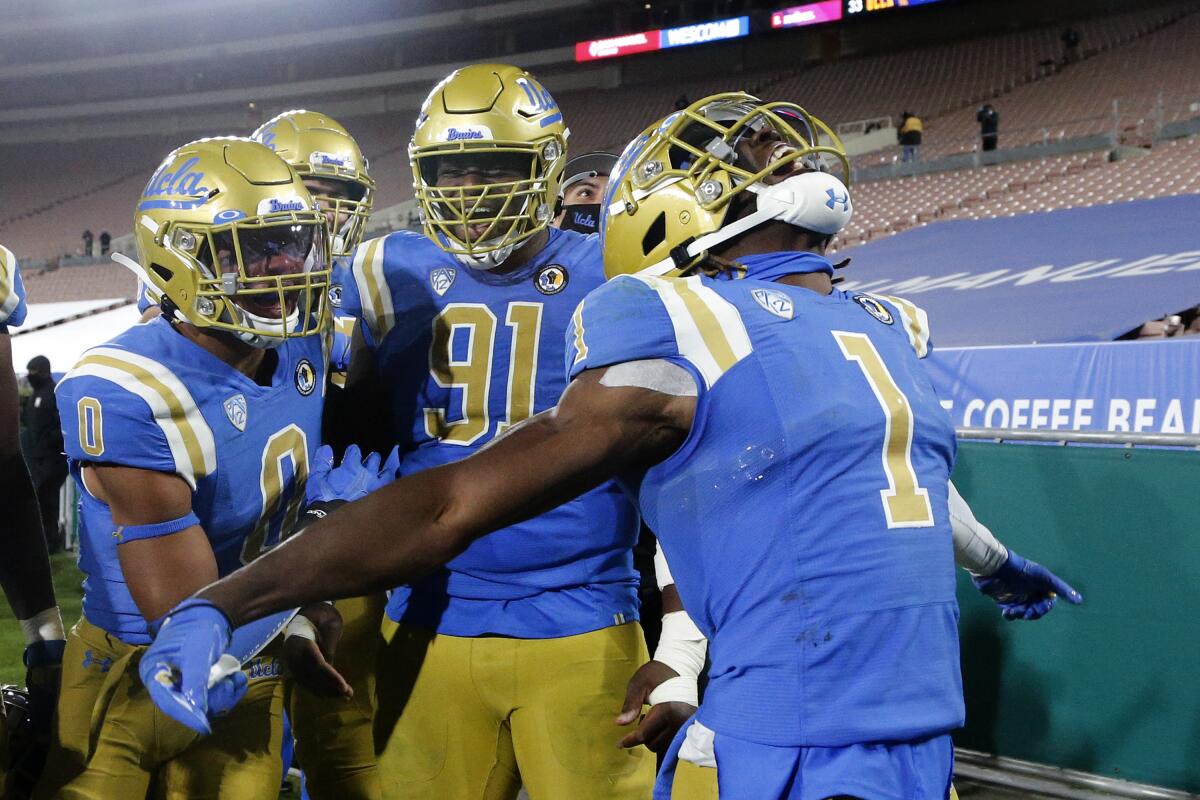
The superconference mock draft rolls on with a few big surprises in the second wave.
Thuc Nhi Nguyen is clearly building a gymnastics power, adding UCLA to her arsenal at No. 17.
Bill Plaschke followed with Wisconsin.
J. Brady McCollough explained his next selection:
“As a boy growing up in Bobby Bowden’s Bible Belt, I worshipped at the altar of Charlie Ward and Peter Warrick. If you would have told me then that the ‘Noles would have fallen to me at 19th in a superconference draft in 2021, I would have melted into tears. But now I’m feeling lucky.
“Florida State.”
Ryan Kartje picked Washington and finally added an SEC school to his arsenal, snagging Tennessee.
As the draft rolled on, Plaschke offered Nguyen his No. 23 pick Stanford for No. 17 UCLA.
She rejected the offer. Twice.
Later, Plaschke shook up traditional thinking and plucked BYU at No. 31.
A look at the top 32 picks, which includes one non-Power 5 school:
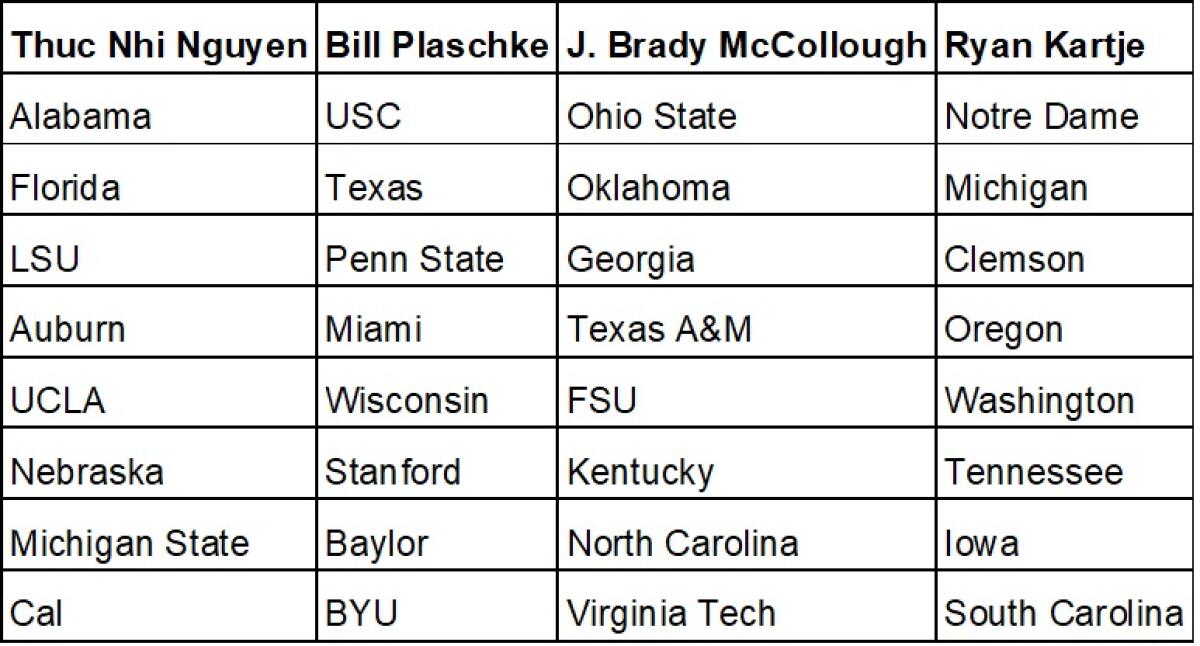
Check back soon for more picks.
- Share via
Check out the top 16 picks in our superconference draft
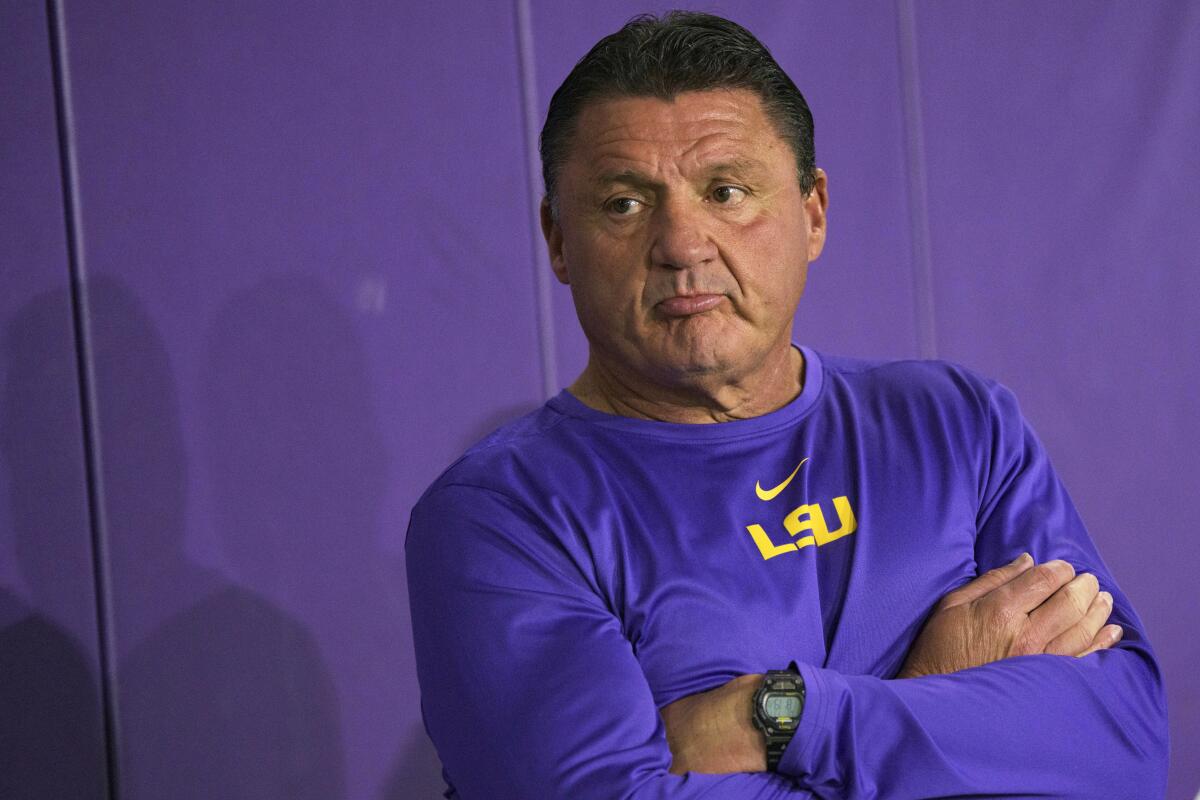
Our superconference draft continues.
After Ryan Kartje picked up Notre Dame and Michigan, J. Brady McCollough countered by raiding what is now the Big 12 and added:
“Have fun with that miserable group, Ryan. We’re looking for that combination of unmistakable blueblood and current power that has a hold over the attention of its entire region every Saturday.
“Boomer Sooner.”
Bill Plaschke plucked Texas next and Thuc Nhi snagged the SEC’s Florida and LSU back-to-back to round out the top nine.
“Really wasn’t intending to create another SEC, but here we are,” Nguyen responded.
The picks continued until reached the top 16 listed below.

Check back soon for more picks, including our first Group of Five selection.
- Share via
Alabama is No. 1, but find out who comes next
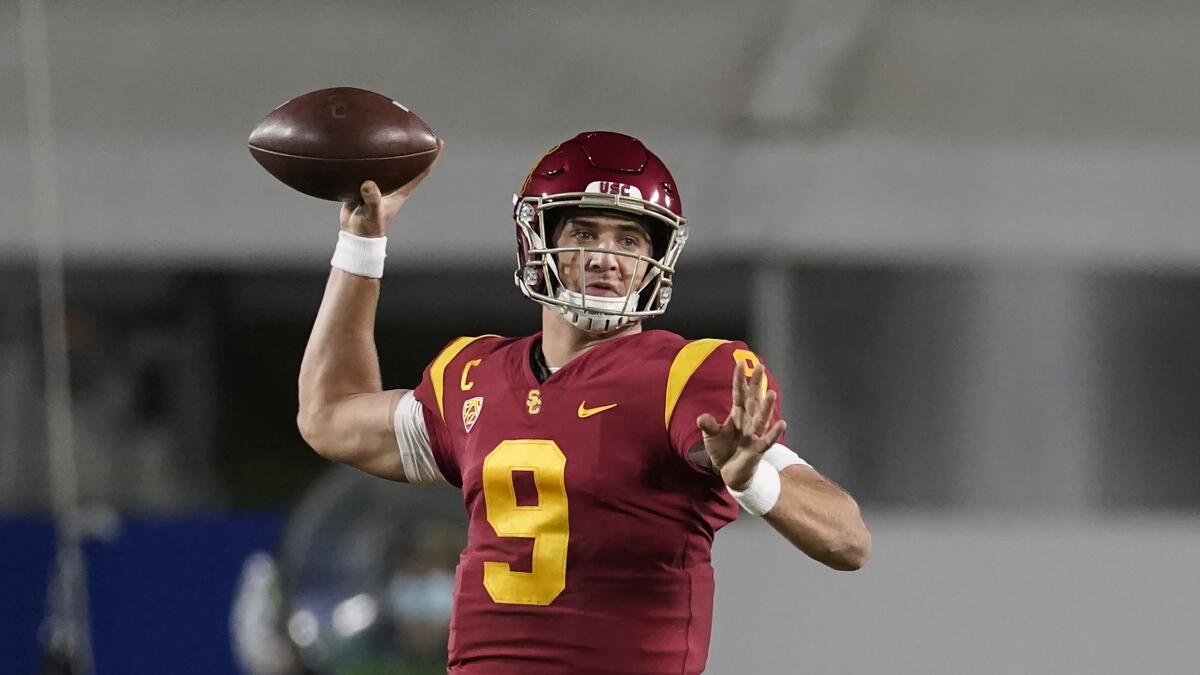
With the No. 1 overall pick, Thu Nhi Nugyen selects ... Alabama.
Bill Plaschke was up next.
“With the second overall pick, Plaschke takes what will be the NIL capital of the world … their quarterback already has a deal with LeBron’s people? ... Their recruits will be directed straight to IMG? ... In three years, they will be Hollywood’s sports program bathed in Hollywood riches ... USC.
Michigan alum J. Brady McCollough was up next:
“Anybody else hate the school they picked first with every fiber of their being? Ohio State.”
Finally, Ryan Kartje delivered the next two picks:
“As a Michigan Man myself, I am appalled by Brady’s focus on winning football games with a good coach while recruiting better than anyone else.
“On that note, for my back-to-back picks, I will stick to my Midwestern roots, print TV money and also conjure up a nice rivalry to build my league around.
“Give me Notre Dame and Michigan at 4 and 5.”
Check back soon for more picks.
- Share via
Draft rules: Here’s how we’re building our 16-team superconferences
I’m Los Angeles Times deputy sports editor Iliana Limón Romero, and I’m the czar of our 16-team superconference draft.
Times writers Thuc Nhi Nguyen, Bill Plaschke, J. Brady McCollough Ryan Kartje agreed to serve as commissioners. We used a random draw to set the draft order and a snake style draft order.
Commissioners could select any school that competes at the Football Bowl Subdivision level, opening the door to selecting independents and Group of Five teams.
Any commissioner could propose a trade.
We’ll reveal the selections in waves, along with running commentary from our commissioners and reactions to trade proposals.
When the draft ends, the commissioners will explain their picks and name their conferences.
